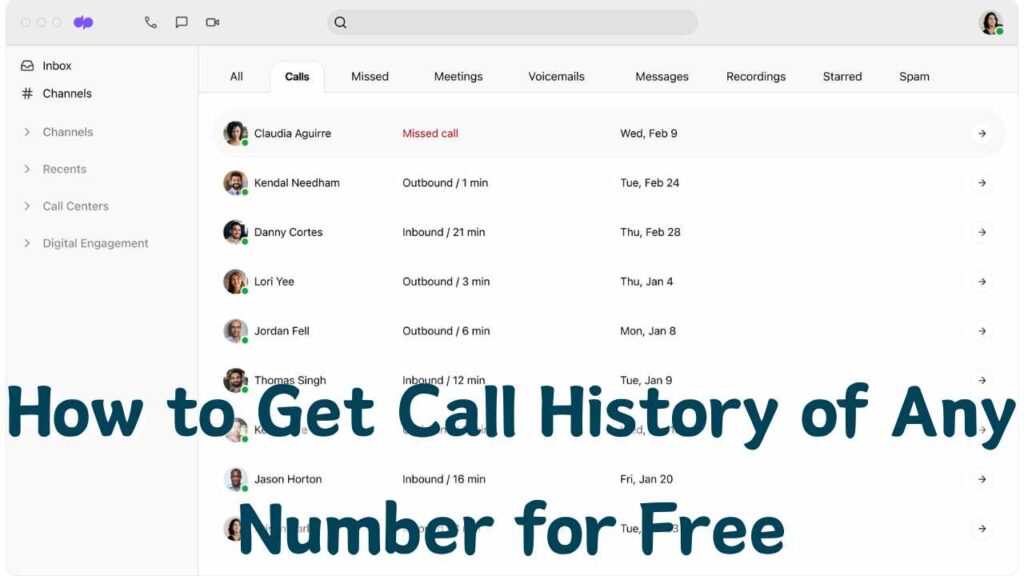Accessing call history for any number, especially without proper authorization, raises significant legal and ethical concerns. Call history contains sensitive personal information, and unauthorized access to it can infringe on privacy rights and be illegal in many jurisdictions. Here’s a comprehensive overview of why accessing call history should be approached with caution and the ethical and legal considerations involved.

Table of Contents
Understanding Call History
Call history refers to a record of incoming, outgoing, and missed calls made from or received on a particular phone number. This data is usually stored by the phone service provider and can include details such as:
- Caller ID: The phone number or name associated with the call.
- Call Duration: The length of the call.
- Timestamp: Date and time of the call.
- Call Type: Whether it was incoming, outgoing, or missed.
Legal and Ethical Concerns
- Privacy Laws: Many countries have stringent privacy laws protecting personal information. Unauthorized access to call history can violate these laws, leading to legal repercussions. For example, in the United States, accessing someone’s call history without permission can be considered a violation of the Communications Act and privacy laws.
- Consent: Accessing call history without the consent of the individual involved is a breach of their privacy. Consent is a crucial factor in any situation where personal data is being accessed or shared.
- Ethics: Beyond legality, ethical considerations play a significant role. Accessing someone’s call history without their knowledge is generally regarded as unethical. It breaches trust and personal privacy, which can have serious consequences for relationships and personal integrity.
Legitimate Methods to Access Call History
If you need to access call history for legitimate reasons, there are proper and legal methods to do so:
- Request from the Service Provider:
- For Your Own Number: Most mobile carriers provide ways for customers to view their own call history through their online accounts or mobile apps.
- For Another Person: If you need call history for another person, you must have their explicit consent. The person can request their call records from their service provider and share them with you if they choose to do so.
- Legal Requests:
- Subpoenas: In legal situations, such as investigations or legal disputes, authorized entities (e.g., law enforcement or legal representatives) can issue subpoenas to obtain call history records from service providers. This process involves court approval and is conducted according to legal procedures.
- Family or Emergency Situations:
- Parental Access: Parents can monitor their children’s phone usage with consent or as part of their parental responsibilities. Many parental control apps offer features to track call history, but they should be used responsibly and ethically.
- Emergency Situations: In emergencies, law enforcement or authorized agencies may access call history to assist in investigations or ensure safety.
Call Details Download
Risks of Using Unauthorized Methods
Using unauthorized methods to access call history poses several risks:
- Legal Consequences: Engaging in illegal activities, such as hacking or using unauthorized software, can lead to severe legal penalties, including fines and imprisonment.
- Security Risks: Many free tools or services claiming to provide access to call history are often scams or malware. Using such tools can compromise your personal information and security.
- Ethical Implications: Unauthorized access to call history can damage relationships and trust, leading to personal and social consequences.
How to Protect Your Own Call History
If you’re concerned about the security of your own call history, consider the following measures:
- Use Strong Passwords: Ensure your phone and online accounts are protected with strong, unique passwords.
- Enable Two-Factor Authentication: Use two-factor authentication (2FA) for added security on your accounts.
- Monitor Your Accounts: Regularly check your phone service accounts for any suspicious activity.
- Be Wary of Phishing Scams: Avoid sharing personal information or clicking on suspicious links that could compromise your security.
Conclusion
Accessing call history should be done with a clear understanding of legal, ethical, and personal implications. While there are legitimate ways to access call history with proper authorization and consent, unauthorized methods pose significant risks and consequences. Respecting privacy and following legal procedures ensures that personal information is handled appropriately and ethically.
Always prioritize lawful and ethical approaches when dealing with sensitive information to avoid legal trouble and uphold privacy standards.
